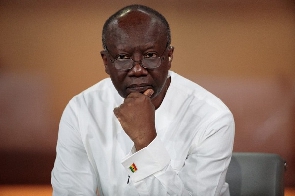 Ken Ofori-Atta is Minister for Finance and Economic Planning
Ken Ofori-Atta is Minister for Finance and Economic Planning
The initial scale of the impact the coronavirus has had on the country’s economy will be known on Wednesday when the Ghana Statistical Service (GSS) releases the results of GDP growth for the first quarter of the year.
Ghana’s response to the pandemic, like in the rest of the world, has seen widespread disruption to routine economic activities, with the Finance Ministry predicting that growth will fall to its lowest in nearly four decades.
Although the disruption caused by the virus has impacted almost every facet of the economy, the services sector has been the most hit.
Since March, the country has shut down its borders, sending the tourism sector, heavily dependent on foreign travellers, into a complete meltdown. The Trades Union Congress (TUC) says the thousands of jobs lost in the sector may not be recovered.
Even before Wednesday’s GDP numbers are issued, the Bank of Ghana’s (BoG) measurement of economic activity in March revealed an unusual contraction.
The central bank’s Composite Index of Economic Activity (CIEA) recorded a negative 2.2 per cent growth in March, in sharp contrast to the 7.1 per cent growth recorded in February and the 5.6 per cent expansion in March 2019.
The BoG data came on the back of a record slump in Ghana’s Purchasing Managers’ Index (PMI) to an all-time low of 31.7 in April, from 41.4 in March, sinking further below the critical 50-threshold that separates improvement in local business conditions from deterioration.
The virus is expected to, among others, knock off nearly US$1.8bn from Ghana’s export earnings, reflecting the slowdown in economic activity, disruptions to trade, and the steep decline in global oil prices.
With the pandemic hitting hard at government revenues, creating a wider-than-expected deficit, the UK-based business advisory firm Economist Intelligence Unit (EIU) has said the economy is heading for a contraction this year, with a forecast real GDP decline of 1 per cent.
“The pandemic will have a significant impact on Ghana’s economic outlook for 2020, necessitating a total rewrite of the 2020 budget. Some of the effects are already showing; financial conditions have tightened and the currency has weakened (with the cedi depreciating by some 7 per cent since March, to about GH¢5.81: US$1 currently),” the EIU said in its April country report.
Goldman Sachs, an international investment bank, also predicted that economic growth will be flat this year, in contrast with government hopes of achieving at least 1.5 per cent growth.
Below expectations
The pandemic shock comes after the country’s economic growth for last year fell below expectation. The 6.5 per cent growth rate recorded was below the 7.1 per cent target the Finance Ministry had previously announced.
The below-expectations performance was caused by a decrease in the growth rate of non-oil GDP, which went down from 6.5 per cent in 2018 to 5.8 per cent in 2019.
The slowdown in the non-oil GDP growth rate was attributed to a 10.4 per cent growth rate in mining and quarrying activities (excluding oil and gas) in 2019 compared to the 48.6 per cent recorded in 2018.